- Home
- Ian McDonald
Be My Enemy Page 23
Be My Enemy Read online
Page 23
One kick from Lieutenant Elena's power-armored boot smashed in the half-rotten door to the observation deck. The Agistry troopers were lined up along the narrow walkway. Everett squeezed his way between the bulky armored warriors and the stone parapet to his position in the line. Order was important: unit 27 could include the civilians in their Nahn confusion fields, but the range was limited. Stray more than three meters away from a suit of golden armor and you would shine like a beacon to whatever senses the Nahn used to sniff out biological material. And the dazzle fields only worked for so long. Just as the Oxford Defense grid constantly shifted frequencies in response to the Nahn constantly evolving new variants, so the Nahn found ways to see through the confusion and pinpoint the precious human meat hidden inside.
The wooden boards were treacherous with frost beneath Everett's boot soles. He landed heavily from the airship's ramp, slipped, grabbed the parapet, and yelled as a length of flaking limestone broke off in his hand and crashed to Queen's Lawn. He had never felt afraid of heights on the ship, but here everything was ramshackle and rickety and rotted. If it's safe enough for a squad of soldiers in full power armor it's probably okay for me, Everett told himself.
“Word of advice, sir,” Sharkey said as Everett squeezed past. “Only kill what needs killing.”
“Your weapons can't kill the Nahn,” Lieutenant Kastinidis called back from farther up the line. The helmet speakers made her voice mechanical and anonymous, but she could be recognized by the name between her shoulders, the two stars on her upper arm shields, and the snake-haired medusa head on her helmet. You painted that yourself, Everett thought. What does it remind you of, Greek home or Greek parents? The stare of the Medusa turned you to stone. The stare of the Nahn did worse. The stare, the eyes. The eyes are the last thing to go. Stop thinking that. Stop seeing that in your imagination.
“No ma’am, but they can slow Satan-spawned abominations,” Sharkey said. “And, I hope, hurt them. Hurt them very much.”
The party formed up. Two soldiers took point, then Tejendra and Everett with the lieutenant between them, then two more soldiers, then Sharkey and the rearguard of two. Tejendra looked terribly small and vulnerable to Everett. He wished he had something to give him to make him feel more powerful and in control. Not a gun. Guns did not make you feel powerful. A gun was what you used when you were out of all other options.
“We're going down,” Lieutenant Kastinidis ordered. “Civilians: you only engage the enemy under my express command. At all times, you follow orders automatically and immediately without delay or question. At all times.”
Everett saw Tejendra flash a smile behind the lieutenant's hulking back. Everett knew that look: the Punjabi disrespect for authority. Military bollocks.
A wooden staircase wound down the walls of the tower. The center was occupied by a heavy timber frame carrying a peal of bells. It was the same in his Queen's Tower, Everett knew. He had heard them rung on graduation days. The wooden steps creaked alarmingly under the weight of soldiers in power armor. Everett decided against trusting the hand rail. One warning was enough.
A voice called out from farther up the stairs. The helmet speakers made them all sound the same. “Hey, look. Bats in the belfry.”
Dark shapes like dead autumn leaves hung from the beams that bore the bells of Imperial University, row upon row upon row, wrapped in black leather wings. Everett paused and looked more closely. Something not quite right. Something not quite mammal.
Armored left arms swung on to target. Everett's sinuses and fillings ached as the EM pulse guns charged up.
“Hold your fire,” Lieutenant Kastinidis said. “The moment we let rip they'll know we're here. Winkelman, low-level scan.”
The bottom-most soldier—the other woman in the squad, Everett had learned, as he waited in the out dock for the soldiers to seal their helmets—lifted up her scanner. She worked it slowly and methodically across the tower interior. The EM gauntlets never wavered in their aim.
“Inactive,” Trooper Winkelman declared eventually.
“Not dead.”
“Not alive either.”
“Move out,” Lieutenant Kastinidis ordered.
Not alive, not dead. Everett found he was holding his breath and tiptoeing past the rustling rafters of dormant nanotechnology. Were they what was left of the researchers and students of Imperial, the ones for whom the evacuation tilt jets never came? He thought about Colette Harte, his almost-big-sister, almost-friend, almost-aunt from the Imperial in his world. Had she worked with Tejendra Singh in this world too? Had she been on the genius list of those who were evacuated or was what remained of her shattered into hundreds of Nahn death bats?
The bottom of the tower couldn't come soon enough. Another kick from the lieutenant sent the door flying. Light poured into the gloomy tower interior. The soldiers trooped across the snow-dusted quad, bronze on white. Everness filled half the sky above them, too huge to land among the cluttered lecture halls and research blocks.
Trooper Winkelman held up a hand. Everyone froze. She turned in a circle, scanner held high.
“I'm getting Nahn activity.”
Everett felt his stomach tighten in fear.
“Low-level stuff, just above background hum. I'm getting small random peaks all around us. Nothing serious. There's a big spike to the northeast, around about Hyde Park Corner.”
“Reset frequencies,” Lieutenant Kastinidis ordered. “Code 387.” The troopers all touched their left gauntlets. Figures flowed. Keeping one frequency shift ahead of the Nahn, Everett thought. “I'd be a lot happier without that big fairy airship floating up there,” the lieutenant said. “Lit up all over the frequencies like a Christmas tree.” She waved her squad on. Bootprints in the snow.
Cameras. Watch out for the cameras. The cameras are watching out for you. Charlotte Villiers had given Everett M a brief introduction to the design and piloting of Earth 3 airships in the car down to Earthport 1. They had cameras all over the hull. A lot of cameras. Airship design, how to fly the hedgehopper, Thryn battle suit 101, secret passwords, the brief history of Earth 1—so much to take in and memorize, but forgetting any part of it could put him in real danger.
Airships, Charlotte Villiers had said, have lots of cameras underneath and to the sides for when they come in to dock or make landfall to load cargo. They have fewer on the upper surface, since they don't need to look up as much as they need to look down. And they have one blind spot, right behind the upper tail fin. “Keep your line straight and your angle of approach true,” Charlotte Villiers had said. “And hope they are too distracted by other things to be paying too much attention to the monitors.”
Everett M took the hedgehopper away from Everness in a wide loop, climbing all the time, high over Marble Arch and Paddington. The wind was sharp as glass blades around the edge of his goggles, but the air felt clean and pure after the infected earth. Over Bayswater Everett M leaned on the steering bar and made his turn, lining up on the airship's great tail fins, like the crosshairs of a huge target. What were they looking for in there? He didn't need to know. All he needed was to get in unseen, plant the tracker, use it to call in the Heisenberg Gate, and get out. The hedgehopper zoomed down over Kensington Gardens, Everett M using his Thryn-enhanced vision to lock on to the upper tail fin. Numbers and graphics flickered across Everett M's eyeball. Keep the fin inside that circle, fly inside that cone. Five, six minutes work and it would be done. Five, six minutes and he would be off this world forever.
Everett Singh, I'm coming for you.
The last person out before the Nahn swarm hit the university had locked the doors to the Huxley Building. The lock posed no more of an obstacle to Unit 27 than it had the Nahn. The glass shattered into glittering dust. The squad filed into the lobby and spread out, covering the corridors and mezzanine, civilians safe at the center of the circle, overlapped by scramble fields.
“Dr. Singh?”
Tejendra started. He had been scanning around the re
ception area—the signs, the desks, the vending machines, the notice boards, the computer monitors, the architectural light fitting in the main stairwell, the leather sofas, the low tables, and the magazines from fifteen years ago left where they had been set. Dust lay thick. Cobwebs had collected in the corners and between the bars of the staircase handrails and in the intricate spaces of the designer chandelier, which had once presumably looked like a waterfall of light. But there was none of the peeling paint, the stripped wood, the lifting floor, the broken windows, and the invading mold and plants of dead cities. The place looked as though it had been entirely undisturbed by the nanotech apocalypse and the intervening fifteen years.
It was the smell that froze Everett to the spot. It was not foul, or rotting, or moldy. It was clear and distinct. It smelled of Huxley, a hundred times. Everett knew that every building has its own distinctive smell: the locker room at Bourne Green, Ryun's kitchen, his own house. You smelled it best and clearest after you had been away after term or on vacation. Smell memory is short, but it's powerful. Electricity, shiny paper, printer ink, books, overheated coffee, paper cups, toilet cleaner…thought. Thought had a smell, like electricity, but more thrilling, more dangerous. Thought smelled like a storm, like a summer morning, like unexpected snow. All these Everett smelled locked up inside this Huxley Building, and they took him out across worlds to the Huxley Building in the Imperial he knew. Colette Harte, spooning low-calorie sweetener into her coffee; Paul McCabe, when he was a smiling bumbler with a Northern Ireland accent; his dad.
“It's the same,” Everett whispered.
“I'm sorry?” Tejendra said.
“Dr. Singh, which way?” Lieutenant Kastinidis asked.
“I came in at the tail end of the project.…I was just a postgraduate researcher processing data. When the funding was cut I moved to my own research.”
“Dr. Singh, do you know where the device is?” Lieutenant Kastinidis asked.
“I think it's in storage. Down in the basement.”
Everett heard Sharkey loudly murmur the word, “think.”
“In my world, that's where they built the first Heisenberg Gate,” Everett said.
Tejendra smiled. “In my world too.”
“Move out, Dr. Singh,” the lieutenant said. “After you. Don't get too far ahead.”
“It needs a name,” Everett said to Tejendra as he led the squad along the gloomy central corridor that still smelled of floor polish. “We always give things names in my family, me or my dad.”
“It has a name: the Multiversal Quantum Entanglement Resonator.”
“That's what it does, not what it is. A cool name like the Infundibulum.”
Tejendra hesitated at a set of fire doors.
“Dr. Singh…” Lieutenant Kastinidis's voice had lost all patience. “Get it, get it quick, get out. Time for word games and making up names when you're back on the ship.” Does she even know why we're looking for this unnamed thing? Everett wondered.
“It should be through these doors and down the service stairway,” Tejendra said. “It all seems smaller than I remember.”
Trooper Winkelman was making another slow scan.
“There's something going on. It's like information flowing from Hyde Park to the Dark Tower and back again.”
“Your evaluation?” the lieutenant asked.
“I don't know. I've never seen anything like this before.”
“‘Oh Lord make haste to help me,’” Sharkey muttered.
“Okay, we're going down,” the lieutenant ordered. “Cover the civilians. Lights.”
Headlights sprang to life on either side of each helmet. Everett remembered an old YouTube video of Orbital playing a set at Glastonbury, the band members with flashlights on each side of their heads. It was a silly, trivial thing to think. Exactly what you would think if you were very, very scared. The lead trooper pushed open the fire doors. Wind sighed somewhere deep beneath the building. It was black down there. The helmet lamps threw double pools of light on the walls and the stairwell. Down. Everett had always hated those sections in games where you ran around in the dark, waiting for your light to touch something hideous.
The lights darted this way and that down the corridor as the lieutenant's squad checked and cleared each of the storerooms. Signs of decay down here: shelves overturned, files scattered, papers strewn, plastic boxes tipped over. These rooms had been cleared. Everything that might be useful in the war against the Nahn had been stripped. Room after room after room.
“Nahn, ma’am.” Every helmet light beamed into the storeroom. Armored fists were raised. Sharkey leveled his shotgun. Long stalactites of black ooze dripped from a black patch on the ceiling. Drips on the floor were frozen into little crowns of Nahn stuff. Winkelman scanned it.
“Inactive,” she said. “Been dead a long time.”
“What did you keep in here?” the lieutenant asked.
“What I want to know is, who killed it?” Sharkey asked.
In the next storeroom the headlight beams glittered from metal and circuitry.
“What is that? Light it up,” the lieutenant ordered.
The flashlights lit up a thick metal disk, three meters across, covered in wires and coolant pumps and heat exchangers. Webs of cable ran from it into the darkness. At the center was a hole the size of Everett's hand. He had seen that hole, this disk before. He had seen it on a wmv file on Ryun Spinetti's computer, but he knew that the real one stood in a basement like this one under Imperial College, just as this one stood in an almost identical basement under Imperial University.
“The original Heisenberg Gate.”
“Lieutenant.” Sharkey's voice was loud in the dark, musty, dusty room. He spoke the word with the accent of an American Confederate.
“Enough archaeology. Move out,” Lieutenant Kastinidis ordered.
“Lieutenant,” Sharkey insisted. “They're going to leave you.”
“We don't have time for this.”
“The Brigadier and the Agister. They got a plan, ma’am.”
“Enough, Mr. Sharkey.”
But Everett had heard power armor move enough to know what that whine of motors and shuffle of feet meant. The squad was troubled. And he knew that Sharkey had heard the rustle of discontent too.
“Once they have this device, do you know what they'll do? Open up a gate and get the hell out of this world.”
“Impossible. The sun…”
“We got here. They made a deal with us. You help us find the device; they get a free ride to whatever universe they want. I didn't hear them mention you.”
“You're lying.”
“‘The Lord be a true and faithful witness between us,’” Sharkey said. “Why do you think they came in the ship? Your Brigadier, maybe, but the Agister? She's surely a woman of many parts, but none of them, I think, is military. Do you concur?”
“One more word from you and I will shoot you. I mean that most sincerely, sir.”
The darkness was deep, the light unsteady, but Everett thought he saw a small smile on Sharkey's face. He didn't need to say one word more. He had said quite enough. The seeds were planted.
“We complete this mission, we get out. Now, where is this thing, Dr. Singh?”
I have underestimated you, Myles O’Rahilly Lafayette Sharkey, Everett thought. Sometimes it's not a choice between saving Everett and saving the ship. Sometimes both can be done at the same time.
The storeroom at the very end of the corridor was a spooky museum of dead technology. Here stood a dozen Heisenberg Gates, obsolete dusty gateways to nowhere. The glint of helmet lights off white insect wings startled Everett, then more lights came to bear and he saw that the object was a drone. Cobwebs dripped from the fan engines in its delicate wings. Everett had seen a similar device come out of the Heisenberg Gate under Imperial College after a fantastical flight over the domes and minarets of E2 London. Similar but different.
“Gathering dust,” Tejendra said. “We went from the que
en of sciences to Cinderella in a single moment. Nanotech was the thing now. Nanotech would solve everything. There was money in nanotech. There were things we could make and sell. There was never any money in the multiverse. This way.”
Helmet lights struck strange shadows from row upon row of steel shelving. Cubes, boxes, rectangles, neatly arranged. They all looked perfectly anonymous to Everett, but Tejendra worked slowly along the line, checking each one carefully and thoroughly. He stopped, laid a finger on a small box the size and shape of an old-fashioned paperback book.
“I think…”
“It looks like a computer drive,” Everett said.
“A quantum computer drive. I'll need to boot it up to find out if it's still working.”
Everett's heart lurched in his chest. He had never thought that the mapping device, the Panopticon, might not work. When you need a thing so badly, you can't—you dare not—imagine failure.
Lieutenant Kastinidis stepped forward. “Give it to me.” She turned the little box over in her gauntleted hands. “Looks like a standard socket. We haven't invented much in fifteen years.”
“We haven't invented anything,” Tejendra said.
The lieutenant popped a panel in her left wrist and ran out a power cable.
“As long as that thing doesn't eat too much power. I need every watt.”
Tejendra plugged in the Panopticon and stroked the upper surface. A single blue dot woke in the center of the panel and glowed beneath the metal. Then the room was filled with glowing stars, turning slowly like the great, billion-year wheeling of galaxies.

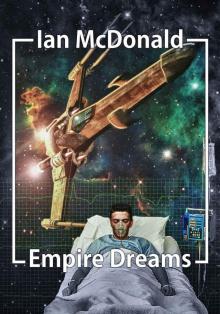 Empire Dreams
Empire Dreams The Menace from Farside
The Menace from Farside Luna: Moon Rising
Luna: Moon Rising Moon Rising
Moon Rising Desolation Road dru-1
Desolation Road dru-1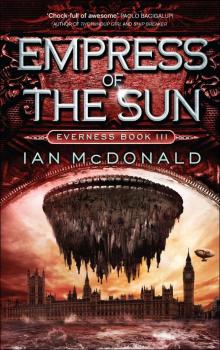 Empress of the Sun
Empress of the Sun Ares Express dru-2
Ares Express dru-2 Tendeléo’s Story
Tendeléo’s Story River Of Gods
River Of Gods Luna
Luna![Cyberabad Days - [River of Gods 02] Read online](http://i1.bookreadfree.com/i1/03/29/cyberabad_days_-_river_of_gods_02_preview.jpg) Cyberabad Days - [River of Gods 02]
Cyberabad Days - [River of Gods 02]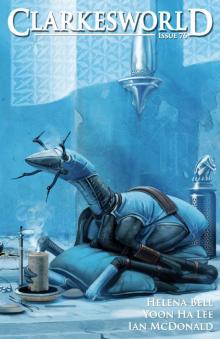 Clarkesworld Magazine Issue 76
Clarkesworld Magazine Issue 76 Brasyl (GollanczF.)
Brasyl (GollanczF.) Scissors Cut Paper Wrap Stone
Scissors Cut Paper Wrap Stone Chaga
Chaga Time Was
Time Was Cyberabad Days
Cyberabad Days Be My Enemy
Be My Enemy Changa
Changa King of Morning, Queen of Day
King of Morning, Queen of Day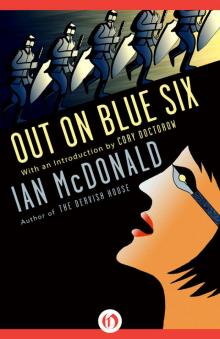 Out on Blue Six
Out on Blue Six Sacrifice of Fools
Sacrifice of Fools Desolation Road
Desolation Road Luna--Wolf Moon--A Novel
Luna--Wolf Moon--A Novel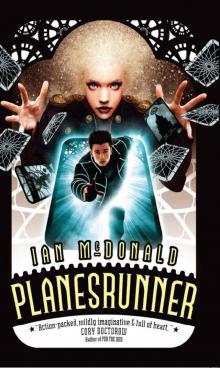 Planesrunner (Everness Book One)
Planesrunner (Everness Book One) Ares Express
Ares Express